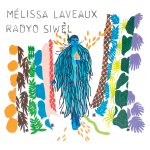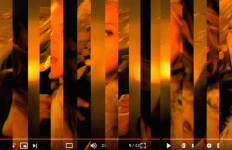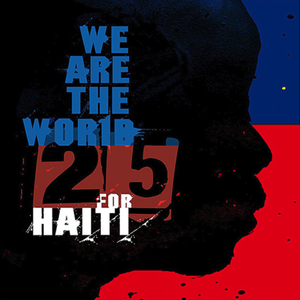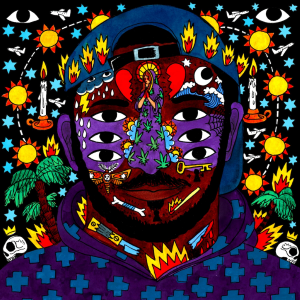Welcome to the shortest guess thread, ever. I'll save you the trouble of having to skim these 5 pages to find the reveal.
My pick for March is Melissa Laveaux - Radyo Siwèl.

When deciding on what to pick, there were multiple factors in choosing. Not only did it have to sound good, or the fact that wanted it to be an artist this forum likely hasn't heard, I wanted it to be important. And in my research it couldn't have been more apparent that this was all three. I'm not going to even attempt to summarize (see: poorly) how this album came to fruition and why it meant so much to Melissa to write this. So, instead, I'm going to copy-paste from articles I found to be insightful and inspiring.
"Born to Haitian parents in Ottawa, she describes her childhood as traditional, though with one missing aspect – her parents wanted Laveaux and her sister to assimilate and speak perfect English and French, so refused to teach them Creole. “All the cool Haitian kids spoke Creole. It felt like a sorority we didn’t have access to,” says Laveaux. “It felt like something was missing.” - The Guardian.
"In April 2016, Mélissa Laveaux left for Haiti, twenty years after the last holidays she spent in the Cap-Haïtien region. She knew only a few figurative Creole expressions, mostly from her mother’s phone conversations with her aunts, when they would exchange zins (the latest gossip). In Haiti, Laveaux got a hold of recordings and notebooks, but also people’s stories. Although the memories were scattered around in bits and pieces, they were all still so alive. She listened to those constantly reinvented songs that were present throughout the long and tortuous history of Haiti. One of the periods that Mélissa focuses on is the occupation of the island by the United States, from 1915 to 1934." - PAM (Pan-African Music)
"She returned home from Haiti with a head full of sounds, melodies, moods and stories of distant times, as a track-list emerged, rich in the multi-layered allegories and symbolism that are characteristic of Haitian poetry and song, like a coded language of resistance. From these she built Radyo Siwèl , a unique album steeped in Haitian history and culture and yet which is also highly personal and intimate. Radyo Siwèl is very important to me because there's the whole part about remembering your ancestry and honoring your ancestors and elders , she explains. I'm getting reacquainted with parts of my heritage my parents left out when they were raising me." - Bonsound
RIYL: Oumou Sangaré, Lou Doillon, Leyla McCalla, Ayọ, Lhasa de Sela
Below; I've linked a few of the stores where availability wasn't a huge concern.
US:
Merchbar
Walmart
Deep Discount
Park Avenue CD's (if your local has a site, check theirs also!)
Dodax (US)
EU/UK:
No Format (Label)
Bandcamp
Dodax (UK)
Amazon (UK)
FR:
Dodax (FR)
Amazon (FR)
As I've only reached out to her recently for some involvement in this, I'm hopeful to get at least something going and will announce in thread should that arise.
My pick for March is Melissa Laveaux - Radyo Siwèl.

When deciding on what to pick, there were multiple factors in choosing. Not only did it have to sound good, or the fact that wanted it to be an artist this forum likely hasn't heard, I wanted it to be important. And in my research it couldn't have been more apparent that this was all three. I'm not going to even attempt to summarize (see: poorly) how this album came to fruition and why it meant so much to Melissa to write this. So, instead, I'm going to copy-paste from articles I found to be insightful and inspiring.
"Born to Haitian parents in Ottawa, she describes her childhood as traditional, though with one missing aspect – her parents wanted Laveaux and her sister to assimilate and speak perfect English and French, so refused to teach them Creole. “All the cool Haitian kids spoke Creole. It felt like a sorority we didn’t have access to,” says Laveaux. “It felt like something was missing.” - The Guardian.
"In April 2016, Mélissa Laveaux left for Haiti, twenty years after the last holidays she spent in the Cap-Haïtien region. She knew only a few figurative Creole expressions, mostly from her mother’s phone conversations with her aunts, when they would exchange zins (the latest gossip). In Haiti, Laveaux got a hold of recordings and notebooks, but also people’s stories. Although the memories were scattered around in bits and pieces, they were all still so alive. She listened to those constantly reinvented songs that were present throughout the long and tortuous history of Haiti. One of the periods that Mélissa focuses on is the occupation of the island by the United States, from 1915 to 1934." - PAM (Pan-African Music)
"She returned home from Haiti with a head full of sounds, melodies, moods and stories of distant times, as a track-list emerged, rich in the multi-layered allegories and symbolism that are characteristic of Haitian poetry and song, like a coded language of resistance. From these she built Radyo Siwèl , a unique album steeped in Haitian history and culture and yet which is also highly personal and intimate. Radyo Siwèl is very important to me because there's the whole part about remembering your ancestry and honoring your ancestors and elders , she explains. I'm getting reacquainted with parts of my heritage my parents left out when they were raising me." - Bonsound
RIYL: Oumou Sangaré, Lou Doillon, Leyla McCalla, Ayọ, Lhasa de Sela
Below; I've linked a few of the stores where availability wasn't a huge concern.
US:
Merchbar
Walmart
Deep Discount
Park Avenue CD's (if your local has a site, check theirs also!)
Dodax (US)
EU/UK:
No Format (Label)
Bandcamp
Dodax (UK)
Amazon (UK)
FR:
Dodax (FR)
Amazon (FR)
As I've only reached out to her recently for some involvement in this, I'm hopeful to get at least something going and will announce in thread should that arise.
Last edited:








